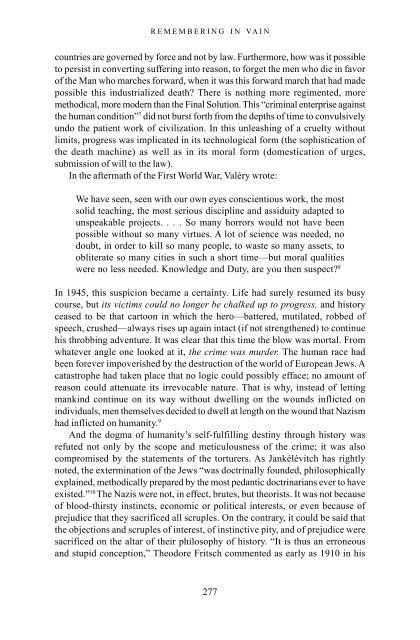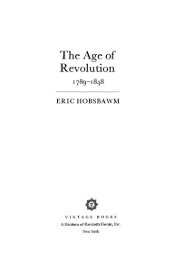The_Holokaust_-_origins,_implementation,_aftermath
The_Holokaust_-_origins,_implementation,_aftermath
The_Holokaust_-_origins,_implementation,_aftermath
You also want an ePaper? Increase the reach of your titles
YUMPU automatically turns print PDFs into web optimized ePapers that Google loves.
REMEMBERING IN VAIN<br />
countries are governed by force and not by law. Furthermore, how was it possible<br />
to persist in converting suffering into reason, to forget the men who die in favor<br />
of the Man who marches forward, when it was this forward march that had made<br />
possible this industrialized death <strong>The</strong>re is nothing more regimented, more<br />
methodical, more modern than the Final Solution. This “criminal enterprise against<br />
the human condition” 7 did not burst forth from the depths of time to convulsively<br />
undo the patient work of civilization. In this unleashing of a cruelty without<br />
limits, progress was implicated in its technological form (the sophistication of<br />
the death machine) as well as in its moral form (domestication of urges,<br />
submission of will to the law).<br />
In the <strong>aftermath</strong> of the First World War, Valéry wrote:<br />
We have seen, seen with our own eyes conscientious work, the most<br />
solid teaching, the most serious discipline and assiduity adapted to<br />
unspeakable projects. . . . So many horrors would not have been<br />
possible without so many virtues. A lot of science was needed, no<br />
doubt, in order to kill so many people, to waste so many assets, to<br />
obliterate so many cities in such a short time—but moral qualities<br />
were no less needed. Knowledge and Duty, are you then suspect 8<br />
In 1945, this suspicion became a certainty. Life had surely resumed its busy<br />
course, but its victims could no longer be chalked up to progress, and history<br />
ceased to be that cartoon in which the hero—battered, mutilated, robbed of<br />
speech, crushed—always rises up again intact (if not strengthened) to continue<br />
his throbbing adventure. It was clear that this time the blow was mortal. From<br />
whatever angle one looked at it, the crime was murder. <strong>The</strong> human race had<br />
been forever impoverished by the destruction of the world of European Jews. A<br />
catastrophe had taken place that no logic could possibly efface; no amount of<br />
reason could attenuate its irrevocable nature. That is why, instead of letting<br />
mankind continue on its way without dwelling on the wounds inflicted on<br />
individuals, men themselves decided to dwell at length on the wound that Nazism<br />
had inflicted on humanity. 9<br />
And the dogma of humanity’s self-fulfilling destiny through history was<br />
refuted not only by the scope and meticulousness of the crime; it was also<br />
compromised by the statements of the torturers. As Jankélévitch has rightly<br />
noted, the extermination of the Jews “was doctrinally founded, philosophically<br />
explained, methodically prepared by the most pedantic doctrinarians ever to have<br />
existed.” 10 <strong>The</strong> Nazis were not, in effect, brutes, but theorists. It was not because<br />
of blood-thirsty instincts, economic or political interests, or even because of<br />
prejudice that they sacrificed all scruples. On the contrary, it could be said that<br />
the objections and scruples of interest, of instinctive pity, and of prejudice were<br />
sacrificed on the altar of their philosophy of history. “It is thus an erroneous<br />
and stupid conception,” <strong>The</strong>odore Fritsch commented as early as 1910 in his<br />
277



